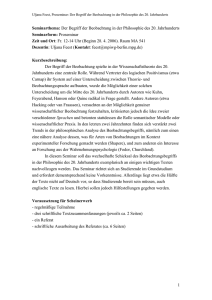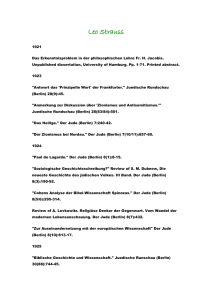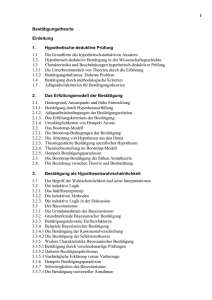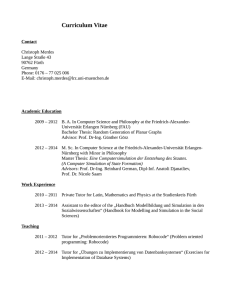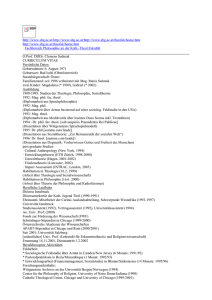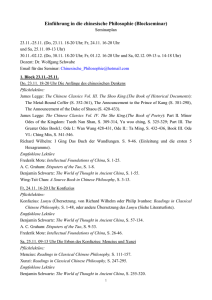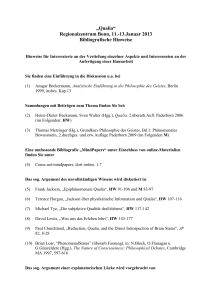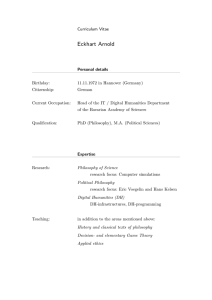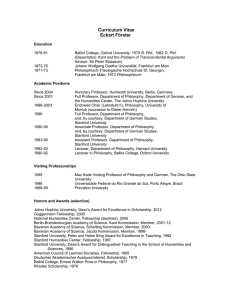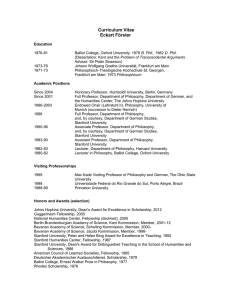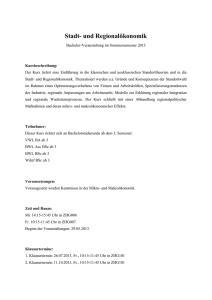Martin Carrier Philosophie des Geistes II Di 10
Werbung
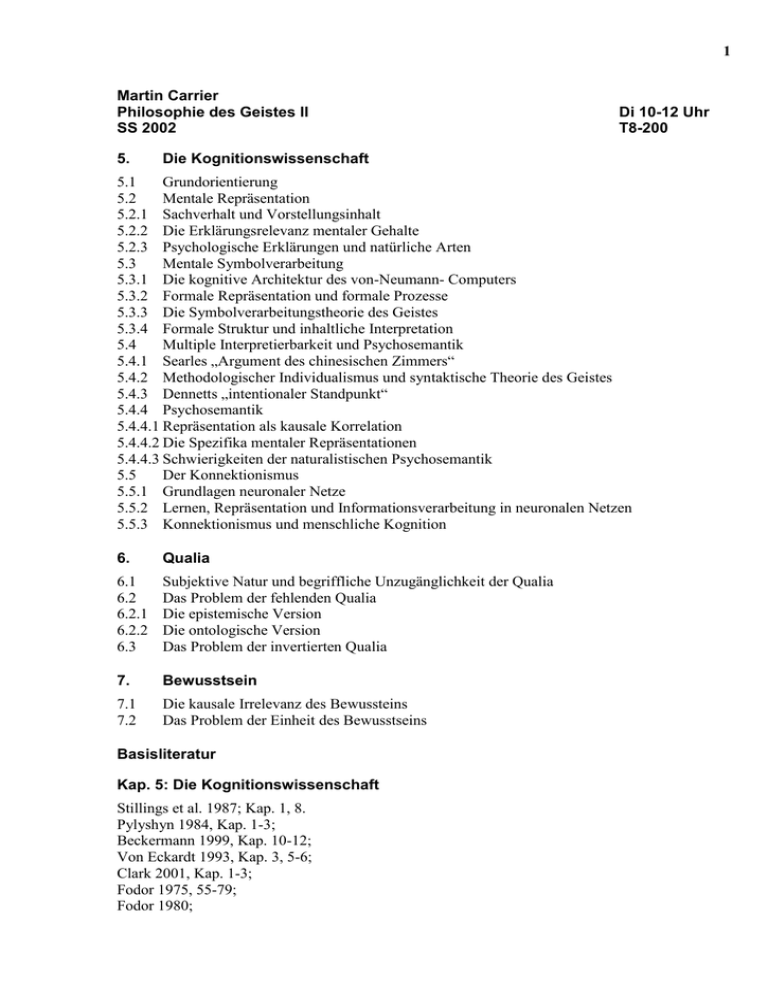
1 Martin Carrier Philosophie des Geistes II SS 2002 5. Di 10-12 Uhr T8-200 Die Kognitionswissenschaft 5.1 Grundorientierung 5.2 Mentale Repräsentation 5.2.1 Sachverhalt und Vorstellungsinhalt 5.2.2 Die Erklärungsrelevanz mentaler Gehalte 5.2.3 Psychologische Erklärungen und natürliche Arten 5.3 Mentale Symbolverarbeitung 5.3.1 Die kognitive Architektur des von-Neumann- Computers 5.3.2 Formale Repräsentation und formale Prozesse 5.3.3 Die Symbolverarbeitungstheorie des Geistes 5.3.4 Formale Struktur und inhaltliche Interpretation 5.4 Multiple Interpretierbarkeit und Psychosemantik 5.4.1 Searles „Argument des chinesischen Zimmers“ 5.4.2 Methodologischer Individualismus und syntaktische Theorie des Geistes 5.4.3 Dennetts „intentionaler Standpunkt“ 5.4.4 Psychosemantik 5.4.4.1 Repräsentation als kausale Korrelation 5.4.4.2 Die Spezifika mentaler Repräsentationen 5.4.4.3 Schwierigkeiten der naturalistischen Psychosemantik 5.5 Der Konnektionismus 5.5.1 Grundlagen neuronaler Netze 5.5.2 Lernen, Repräsentation und Informationsverarbeitung in neuronalen Netzen 5.5.3 Konnektionismus und menschliche Kognition 6. Qualia 6.1 6.2 6.2.1 6.2.2 6.3 Subjektive Natur und begriffliche Unzugänglichkeit der Qualia Das Problem der fehlenden Qualia Die epistemische Version Die ontologische Version Das Problem der invertierten Qualia 7. Bewusstsein 7.1 7.2 Die kausale Irrelevanz des Bewussteins Das Problem der Einheit des Bewusstseins Basisliteratur Kap. 5: Die Kognitionswissenschaft Stillings et al. 1987; Kap. 1, 8. Pylyshyn 1984, Kap. 1-3; Beckermann 1999, Kap. 10-12; Von Eckardt 1993, Kap. 3, 5-6; Clark 2001, Kap. 1-3; Fodor 1975, 55-79; Fodor 1980; 2 Fodor 1986; Searle 1980, 417-424; Searle/Churchland & Churchland 1990; Carrier 1993; Carrier & Mittelstraß 1989, 204-224; Carrier & Mittelstrass 1991, 200-206, 237-244; Kaye 1995. 5.5 Der Konnektionismus Bechtel 1987; Tienson 1987; Hinton 1992; Von Eckardt 1993, 125-138, 176-188; Clark 2001, Kap. 4. Kap. 6: Qualia Nagel 1974; Bieri 1992; P.M. Churchland 1985; Stillings et al. 1987, Kap. 8. Shoemaker 1982a; Flanagan 1992; Papineau 1998. Kap. 7: Bewusstsein Libet 1999; Prinz 1997; Gazzaniga 1998; Lahav 1993; Lahav 1997; Carrier 1997. Texte für das Essay-Training Stillings et al. 1987, 1-15. Chap. 1: „What is Cognitive Science?“ J. Searle, „Ist der menschliche Geist ein Computerprogramm”, in: Searle/Churchland & Churchland (1990), 40-47. Hinton 1992 Bieri 1992 Papineau 1998 Prinz 1997 3 Literatur W. Bechtel (1987) „Connectionism and the Philosophy of Mind“, The Southern Journal of Philosophy 26, Supplement, 17-41. W. Bechtel (1988) Philosophy of Mind. An Overview for Cognitive Science, Hillsdale N.J.: Lawrence Erlbaum. W. Bechtel & A. Abrahamsen (1991) Connectionism and the Mind. An Introduction to Parallel Processing in Networks, Cambridge Mass.: Basil Blackwell. A. Beckermann (1999) Analytische Einführung in die Philosophie des Geistes, Berlin: de Gruyter. A. Beckermann, H. Flohr & J. Kim (eds.) (1992) Emergence or Reduction? Essays on the Prospects of Nonreductive Physicalism, Berlin: de Gruyter. P. Bieri (1981) „Generelle Einführung/Einleitung“, in: Bieri 1981a, 1-55, 139-144. P. Bieri (ed.) (1981a) Analytische Philosophie des Geistes, Königstein: Hain. P. Bieri (1992) „Was macht Bewußtsein zu einem Rätsel?“, Spektrum der Wissenschaft 10/1992, 48-56. M. Carrier (1993) „Die Vielfalt der Wissenschaften, oder warum die Psychologie kein Zweig der Physik ist“, in: A. Elepfandt & G. Wolters, Denkmaschinen? Interdisziplinäre Perspektiven zum Thema Gehirn und Geist, Konstanz: Universitätsverlag., 99-115. M. Carrier (1997) „On the Difficulty of Keeping Consciousness Intact: Lahav on Conscious Integration and Causality”, in: Carrier & Machamer 1997, 195-206. M. Carrier & J. Mittelstraß (1989) Geist, Gehirn, Verhalten. Das Leib-Seele-Problem und die Philosophie der Psychologie, Berlin: de Gruyter. M. Carrier & J. Mittelstrass (1991) Mind, Brain, Behavior. The Mind-Body Problem and the Philosophy of Psychology, Berlin: de Gruyter. M. Carrier & P.K. Machamer (eds.) (1997) Mindscapes: Philosophy, Science, and the Mind, Konstanz: Universitätsverlag/Pittsburgh: University of Pittsburgh Press. D.J. Chalmers (1996) The Conscious Mind. In Search of a Fundamental Theory, Oxford: Oxford University Press. 4 P.S. Churchland (1986) Neurophilosophy. Toward a Unified Science of the Mind-Brain, Cambridge Mass.: MIT Press. A. Clark (2001) Mindware. An Introduction to the Philosophy of Cognitive Science, New York: Oxford: Oxford University Press. T. Crane (2001) Elements of Mind. An Introduction to the Philosophy of Mind, Oxford: Oxford University Press. F. Crick & C. Koch (1992) „Das Problem des Bewußtseins“, Spektrum der Wissenschaft 11/1992, 144-152. M. Davies & G.W. Humphreys (eds.) (1993) Consciousness. Psychological and Philosophical Essays, Oxford: Blackwell. D.C. Dennett (1971) „Intentionale Systeme“, in: Bieri 1981a, 162-183. D.C. Dennett (1991) Consciousness Explained, Boston: Little, Brown Publ. F.I. Dretske (1980) „The Intentionality of Cognitive States“, Midwest Studies in Philosophy 5, 281-294. F.I. Dretske (1983) „Précis of Knowledge and the Flow of Information“, The Behavioral and Brain Sciences 6, 55-90. A.K. Engel, P. König & W. Singer (1993) „Bildung repräsentationaler Zustände im Gehirn“, Spektrum der Wissenschaft 9/1993, 4247. O. Flanagan (1992) Consciousness Reconsidered, Cambridge Mass.: MIT Press. J.A. Fodor (1978) „Computation and Reduction“, in: C.W. Savage (ed.), Perception and Cognition. Issues in the Foundations of Psychology, Minneapolis: Univ. of Minnesota Press, 229-260. J.A. Fodor (1980) „Methodolical Solipsism Considered as a Research Strategy in Cognitive Psychology“, in: J. Haugeland (ed.), Mind Design. Philosophy, Psychology, Artificial Intelligence, Cambridge Mass.: MIT Press, 1981, 306-338. J. Fodor (1981a) „Das Leib-Seele Problem“, Spektrum der Wissenschaft 3/1981, 26-37. J.A. Fodor (1981b) Representations. Philosophical Essays on the Foundations of Cognitive Science, Cambridge Mass.: MIT Press. J.A. Fodor (1986) „Why Paramecia Don’t Have Mental Representations“, Midwest Studies in Philosophy 9, 3-23. 5 J.A. Fodor (1987) Psychosemantics. The Problem of Meaning in the Philosophy of Mind, Cambridge Mass.: MIT Press. J.A. Fodor & Z.W. Pylyshyn (1988) „Connectionism and Cognitive Architecture: A Critical Analysis“, Cognition 28, 3-71. M.S. Gazzaniga (1998) ”Rechtes und linkes Gehirn: Split-Brain und Bewußtsein“, Spektrum der Wissenschaft 12/1998, 84-89. M.S. Gazzaniga & J.E. LeDoux (1978) The Integrated Mind, New York: Plenum Press. G.E. Hinton (1992) „Wie neuronale Netze aus Erfahrung lernen“, Spektrum der Wissenschaft 11/1992, 134143. L.J. Kaye (1995) „The Languages of Thought“, Philosophy of Science 62, 92-110. R. Lahav (1993) „What Neuropsychology Tells us about Consciousness“, Philosophy of Science 60, 67-85. R. Lahav (1997) „The Conscious and the Non-Conscious: Philosophical Implications of Neuropsychology”, in: Carrier & Machamer 1997, 177-194. J. Levine (1983) „Materialism and Qualia: The Explanatory Gap“, Pacific Philosophical Quarterly 64, 354361. B. Libet (1999) “Do We Have Free Will?” Journal of Consciousness Studies 6, 47-57. B. McLaughlin & C. Hill (1999) ”There are Fewer Things Than Are Dreamt in Chalmers’s Philosophy”, Philosophy and Phenomenological Research LIX, 445-454. T. Metzinger (1993) Subjekt und Selbstmodell, Paderborn: Schöningh. T. Metzinger (ed.) (1995) Bewußtsein. Beiträge aus der Gegenwartsphilosophie, Paderborn: Schöningh. T. Nagel (1974) „Wie ist es, eine Fledermaus zu sein?“, in: Bieri 1981, 261-275. D. Papineau (1998) “Mind the Gap,” Philosophical Perspectives 12, 373-388. W. Prinz (1997) „Explaining Voluntary Action: The Role of Mental Content”, in: Carrier & Machamer 1997, 153-175. Z.W. Pylyshyn (1984) Computation and Cognition. Toward a Foundation for Cognitive Science, Cambridge MA: MIT Press, 1986. 6 M. Rowlands (1994) „Connectionism and the Language of Thought“, The British Journal for the Philosophy of Science 45, 485-503. K. Sayre (1987) „Cognitive Science and the Problem of Semantic Content“, Synthese 70, 247-269. J.R. Searle (1980) „Minds, Brains, Programs“, The Behavioral and Brain Sciences 3, 417-457. J.R. Searle (1992) The Rediscovery of the Mind, Cambridge Mass.: MIT Press. J.R. Searle/P.M. Churchland & P.S. Churchland (1990) „Künstliche Intelligenz I-II“, Spektrum der Wissenschaft 3/1990, 40-54. S. Shoemaker (1982a) „The Inverted Spectrum“, The Journal of Philosophy 79, 357-381. S. Shoemaker (1982b) „Functionalism and Qualia“, The Philosophical Review 91, 159-181. S.P. Stich (1983) From Folk Psychology to Cognitive Science. The Case Against Belief, Cambridge Mass.: MIT Press. N.A. Stillings et al. (1987) Cognitive Science. An Introduction, Cambridge Mass: MIT Press. T. Stone & M. Davies (1993) „Cognitive Neuropsychology and the Philosophy of Mind“, British Journal for the Philosophy of Science 44, 589-622. J.L. Tienson (1987) „An Introduction to Connectionism“, The Southern Journal of Philosophy 26, Supplement, 1-16. B. Von Eckardt (1993) What is Cognitive Science?, Cambridge Mass.: MIT Press.
